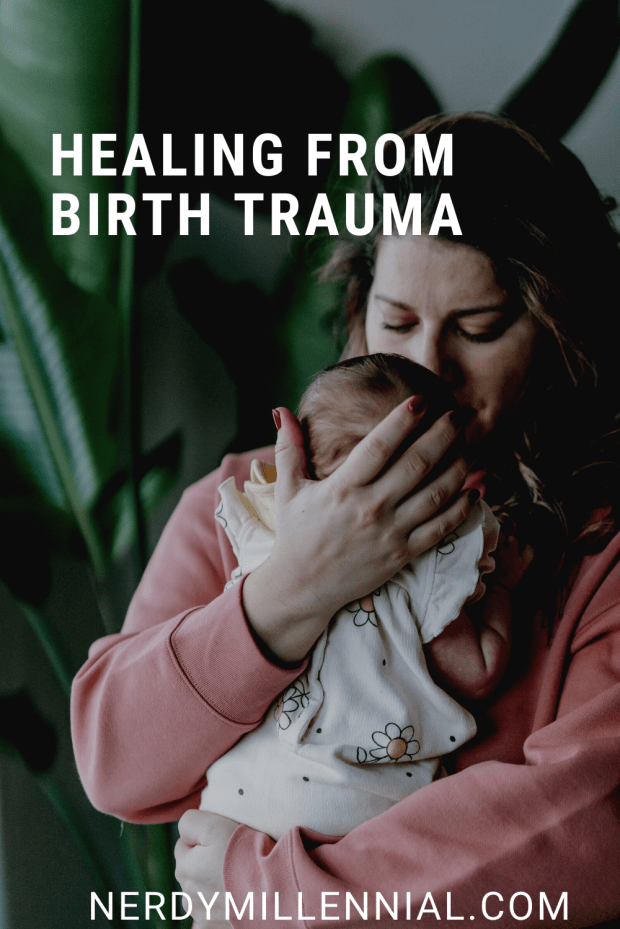Whether there was a complication, an emergency, or labor and birth just simply did not go as planned, some women experience their birth as traumatic; This is what we call birth trauma. Here, I offer some tips for healing from a traumatic birth experience.
Trauma surrounding birth is usually experienced in two ways. Psychological trauma happens when the mother suffers from mental or emotional distress about the events surrounding the birth. Physical trauma is a result of physical injury that took place during birth. It is common for women to experience both types of birth trauma at the same time.
Any type of birth can be traumatic, but there are some events that tend to be more traumatic for mothers. Cesarean section, especially an emergency cesarean, can be especially traumatic, both emotionally and physically. Other common birth traumas include premature labor and birth, forceps delivery, episiotomy, excess blood loss, birth injury to either mother or baby, and any life-threatening events.
If you suffered a traumatic birth experience, the people around you may not completely understand the emotional upset or physical pain that you are going through. This is why it’s important for you to recognize that you need extra help and support and seek it out.
You may have people in your life who want to downplay the severity of what you experienced, saying things like “You just had a hard labor” or “At least you have a healthy baby.” Although these people are trying to help, it’s important that you find a group of people who will validate your feelings.
Find Support
Some organizations and groups exist to support mothers who have experienced a traumatic birth. The International Cesarean Awareness Network (ICAN) provides information and support for women recovering from a cesarean birth. Other organizations that provide birth trauma support include:
Solace for Mothers
The Birth Trauma Association
Trust Birth
A local Doula, Midwife, or Childbirth Educator may be able to offer support and put you in touch with other groups and individuals who will offer support as well. Support can also come in the form of online forums and communities. ICAN and Solace for Mothers both offer these types of online communities.
Continue your Aftercare
Though you may be feeling hurt or angry, you do not want to risk further emotional or physical injury by avoiding care and treatment after birth. If you cannot handle seeing a certain care provider, it’s okay to see someone you are more comfortable with. Any doctor, midwife, nurse practitioner, or even your family physician can complete your follow-up care.
Find and Accept Help
Every postpartum mother needs help, especially if they are recovering from emotional or physical trauma. Find people who are willing to help with housework, meals, older siblings, and caring for you and the baby. Ideally, this should be someone other than your spouse, as he may also be trying to deal with emotions and feelings about the birth. If someone offers to help, accept their offer.
Write down their name and number and ask them what they would be willing to help with. You may also wish to hire a Postpartum Doula, as she is likely to understand what you are going through and offer help that is specific to your needs.
Allow Yourself Time to Heal
It can sometimes feel as if the emotional and physical pain and trauma of birth will never heal or that things will never be “normal” again, but give yourself lots of time. Your body needs time to heal and so does your mind. Remind those around you about this process as well, and let them know how you are feeling and how your body is healing.
Most importantly, don’t be afraid to say no to something if you are not physically or emotionally ready. It’s not okay for anyone to ignore your feelings or need physical healing. If someone in your life is pressuring you, find supportive individuals to stick up for you.
If you had a traumatic birth experience, you are also at risk for developing post-traumatic stress disorder (PTSD), especially if you or your baby were in a life-threatening situation. PTSD is an anxiety disorder that can occur after an individual experience an extremely traumatic event.
Symptoms of PTSD include:
- Re-experiencing or reliving the traumatic event
- Avoiding reminders of the trauma
- Feeling detached from other people and emotionally numb
- Increased anxiety and emotional upset
- Anger and irritability
- Feeling guilty, shameful, or blaming yourself for the birth experience
- Depression or feelings of hopelessness
- Feeling mistrust or feeling betrayed by a spouse, birth support, doctors, or nurses
If you think that you are suffering from post-traumatic stress disorder, it may be best to seek more professional help such as therapy to help you process the events of the birth.
Have you experienced a traumatic birth? What advice would you give other mothers who have recently had a traumatic birth experience?
image used under creative commons by Jon Ovington






Excellent resources, thank you. I really appreciate having this issue discussed, as I had a very traumatic birth with my first, and it took me a long time to heal. It’s good to know there is support.
This is great! I’ve actually recently started focusing my doula practice on supporting women who’ve had previously traumatic births, and have been working with a psychologist here who specializes in birth trauma. Great article…. so important to raise awareness here!